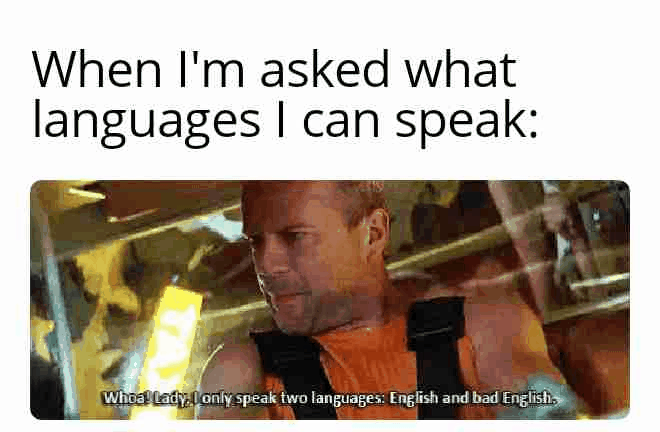Alternatively, in the languages I speak:
Welche Sprachen sprechen Sie? (Deutsch/German)
¿Qué idiomas habla usted? (Español/Spanish)
Quelle langue parlez-vous? (Français/French)
EDIT: These sentences are now up to date.
Bueno!
English natively und ich lerne Deustch (aber ich spreche nur ein bisschen)
!esp@lemm.ee for Spanish speakers
thanks, this is going to help with my exposure.
English is the only language I’m even vaguely proficient in, really.
Le francais est le loin ma deuxieme langue la plus forte. Mais ce n’est toujours pas tres bon, et je dois passer beaucoup de temps pour ecrire dans francais, et generalement rechercher quelques mots ou expressions. Mais ma grammaire est assez bonne, je pense.
I also spent a few years learning Spanish, but almost none of it stuck. And a few years learning Korean while living in Korea. I learnt a few of the necessary words and phrases relating to restaurants and taxis, and some very rudimentary grammar. And being able to read the script is a neat party trick. And one year of actual Vietnamese education + a few more years of peripheral exposure to the language while I lived there. Even less of it stuck than the Spanish though.
Effectivement, ta grammaire est bonne :)
Depends on who you ask. I’m American and went to the UK. I was looking to pick up my rental car, you know, so I could drive on the wrong side of the road and found a sign that read, “rental car collection.” I had to ask a local who was doing the collecting, because I don’t speak English. " If I was collecting the car, it’s a pick up. If they were collecting the car it’s a drop off. So…
I also butcher German and Spanish pretty well.
Ustedes should be hablan
Pas parle Americano
Was Sprachen Sie spricht? (Deutsch/German)
I’m not a native speaker, but I’m pretty sure it’s
Welche Sprachen sprechen Sie?
assuming you want to be formal, which feels a little weird to me in the context of an internet forum.
Edit: but to answer your question: fluent English, mehr als ein Bißchen Deutsch, y un poquito Español.
ein Bißchen Deutsch
BTW, this should be written as:
ein bisschen Deutsch
We switched from ß to ss in all words with a preceding short vowel in 1996: https://de.wikipedia.org/wiki/Reform_der_deutschen_Rechtschreibung_von_1996
So, it’s “Fuß” and “Maß”, because those are pronounced with a long vowel, but then “Fass” and “muss” and “Biss”, because those are pronounced with a short vowel.And in this case, “bisschen” is spelled with a small “b” for reasons that I’m not entirely sure are logical. 😅
It would be spelled with a capital letter, if “Bisschen” was a unit of measurement here (i.e. a small bite), like a “Liter” is.
But because it was used so much and without really referring to a specific measurement, it eventually began being spelled lowercase, similar to “wenig” or “etwas” (“ein wenig Deutsch”, “etwas Deutsch”). Apparently, this kind of word is called an “Indefinitpronomen”.https://de.wiktionary.org/wiki/bisschen
vs.
https://de.wiktionary.org/wiki/Bisschen (much rarer)Thanks! It’s surprisingly difficult to get Germans to correct me on things. Most of them are just happy that I can speak it at all, so they tell me not to worry about the little stuff. 😂
I would like to know how a native german speaker would say it. But I would say like you
Well, if I were to post it to a community on e.g. feddit.org, I would write it as:
Welche Fremdsprachen sprecht ihr so?
“Fremdsprachen” just means “foreign languages”, since I know that responding folks speak German.
Then “sprecht ihr” rather than “sprechen Sie”, because addressing a group of people with direct pronoun is unusual in German.
As someone else already said, using “Sie” is also far too formal for this context. People refer to each other as “Du” on most of the internet.
But “Welche Sprachen sprichst Du?” still gives me vibes of a marketing firm hoping to drive engagement by referring to people directly.And then the “so”, I have no idea what that is linguistically, but it basically makes the question more casual. It invites for people to tell a story or to have a chat.
Thanks for the detailed answer. Interestingly it is pretty similar to the idiomatic way to say it in French. Except for the “so”
“So” is indeed one of those small things that’s just colloquial to casual conversation in in Germany. To me personally it signals that you weren’t as exact with your question so you’re leaving it kinda open ended to some degree. But when it comes to Grammar no clue what this is.
It feels a bit similar to “do you speak any other languages or ~” because this leaves it less as a direct question and more as an open ended conversation, suggesting you just wanna know more and you’re not very particular in your question and in what you expect as an answer.
Sehr gut, danke! Muy bien!
It is indeed normal to use ‘du’ pretty much everywhere on the internet. Even in French i never see ‘vous’ (which to me feels more common than Sie in German usually).
你會哪些語言?(Traditional Chinese)
That’s about it. I am an interpreter and translator between English and Chinese.
Which Chinese language?
Mandarin. I can speak Taiwanese as well.
I only speak two languages: English and bad English.
straylian, and that’s about it.
Or are they shite? You’re right we’re fucked.
I mean. im not so good at english as a native speaker. near the end of college my friend and I traded transcripts and his comment was. you get pretty good grades. oh except in spanish. when I had classes that were straight up english classes I similarly did not do well.
English, Swedish, and Finnish.
Us paraprau ite te reo Tahiti.
Samples from the four I know:
My name is Leni.
Nimi mi li Leni.
Hake anni Leni.
– -.-- / -. .- – . / … … / .-… . -. … .-.-.-
Samples from ones I know selectively:
O Leni to’u i’oa.
Ko Leni toku ingoa.
Meu nome é Leni.
Je m’appelle Léni.
English, Russian, Czech (used to be fluent, but haven’t used in a while), Mandarin (a bit, still learning)











